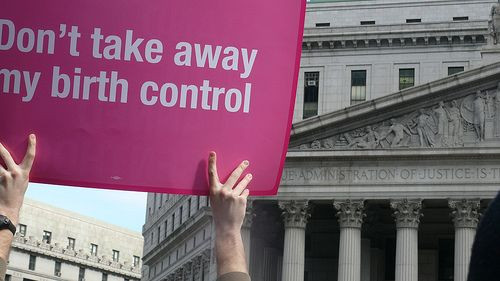Free Birth Control Does Not Make Women More Promiscuous Or Likely To Have Unsafe Sex

Providing women with birth control, be it in the form of pills, intrauterine implants, patches, or rings, doesn’t make them more likely to engage in risky sexual behavior, a new study from the Washington University School of Medicine suggests.
The findings come amid intense controversy whether women — teen girls in particular — put themselves in riskier sexual situations when they have easier access to contraception. The logic goes that young girls wish to have sex without getting pregnant, and it’s only with the newfound supply of birth control that an unfulfilled demand will flourish. But that is not the case, assert the present researchers, who screened the cohort of women they believe is most likely to have unsafe sex.
Using data from the Contraceptive CHOICE Project, the team analyzed the behavior of 9,256 women in St. Louis, aged 14 to 45. Thirty-two percent of the women had a high school education or less, and it’s this cohort the researchers sought to better understand, as women of lower educational attainment are the most likely to have unsafe sex with multiple partners.
"Having multiple partners is a known risk behavior,” said Gina Secura, project director of the CHOICE project, according to Medical News Today. “If sexual behavior were going to change after women received free contraception, you would expect to see that change soon after they got the birth control." But that’s not what happened. Roughly 70 percent of women saw no change in the frequency of their sexual behavior. Meanwhile, 14 percent of women began having less sex once they were on birth control. And among the 16 percent that started having more sex, 80 percent of them went from zero partners to one.
Of the 85 percent of women who completed the survey about their sexual history in the last 30 days, 49 percent had never had a child and 62 percent had had a previous unintended pregnancy. The study lasted one year in total, with check-ins at the six-month mark and at the end. At the onset, 5.3 percent of women said they were having sex with more than one partner. By six months, that number had declined to 3.5 percent, and at 12 months it was down again, to 3.3 percent.
While the median number of sexual partners increased from four to six, critically speaking, the number of complications remained the same: More sex didn’t translate into greater frequency of sexually transmitted diseases.
In truth, the benefits far outweigh the drawbacks. In addition to the obvious benefits of protecting against unwanted pregnancy and abortions, hormonal conception protects women against endometrial and ovarian cancer and keeps women from becoming anemic. It can also make for fewer infertility troubles, more regular periods, and for women who already have polycystic ovary syndrome, a bevy of reduced side-effects.
"The notion that women will have sex with more partners if you give them free birth control didn't pan out in this study,” concluded senior author Dr. Jeffrey Peipert. “Providing no-cost contraception did not result in riskier sexual behavior."



























